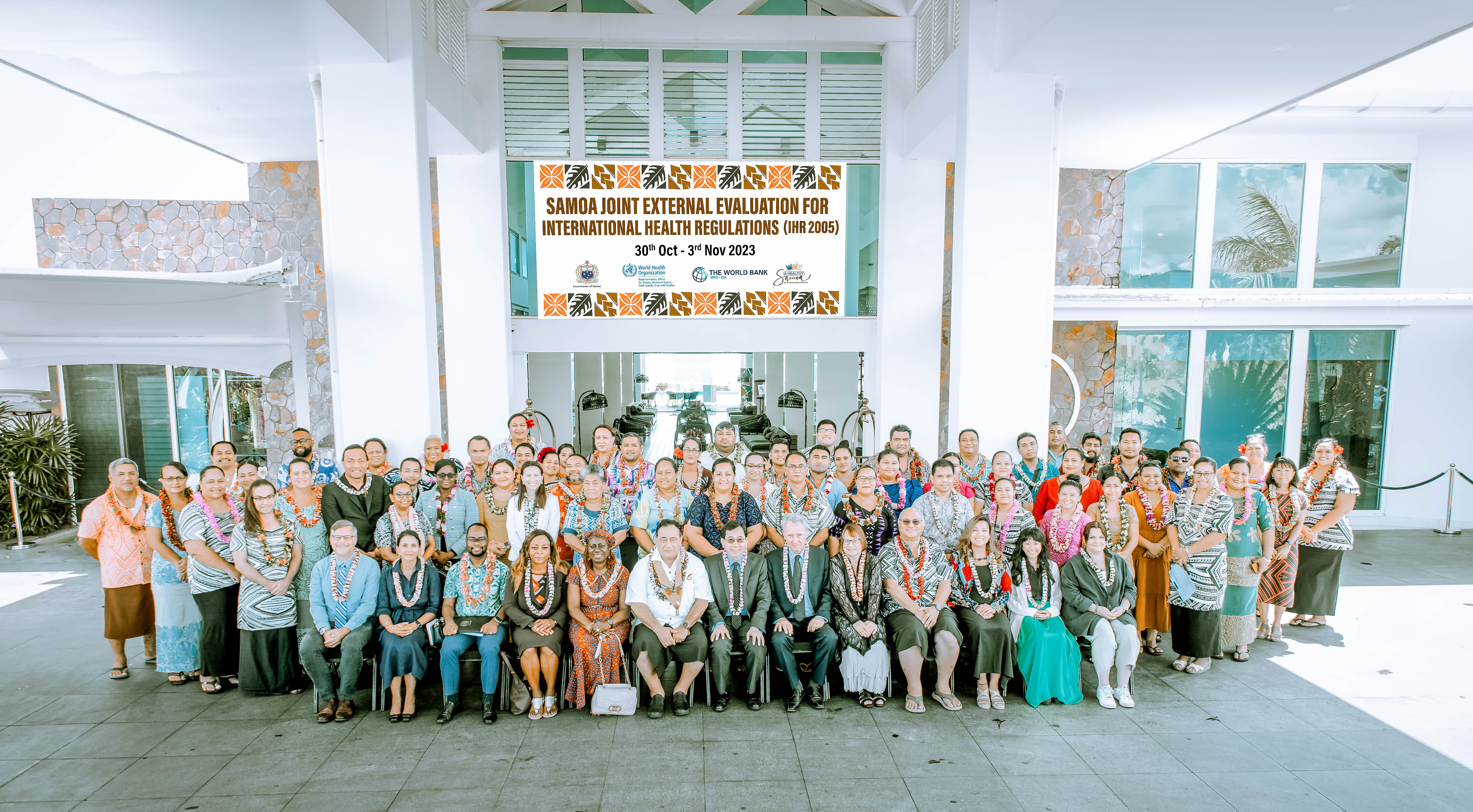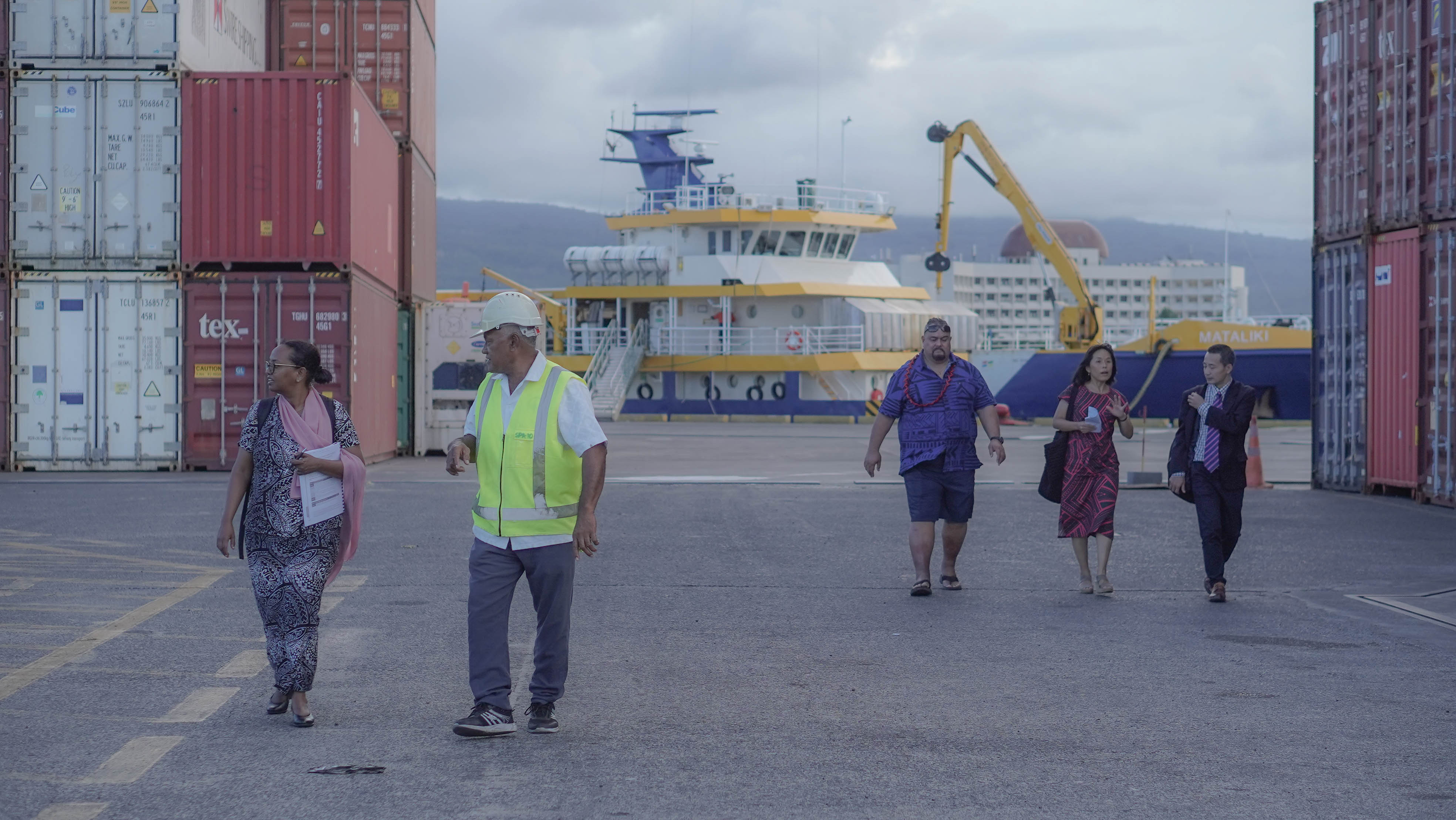The Government of Samoa has completed its first Joint External Evaluation (JEE) of the national capacities required by the International Health Regulations (IHR). The JEE was done in partnership with the World Health Organization (WHO) and the World Bank, and ran all of this week, from 30 October to 3 November 2023.
Joint External Evaluations help countries assess their national capacities to prevent, detect and respond quickly and well to public health risks. The JEE process is voluntary, collaborative, and multisectoral – that is, involving more parts of the government and wider society than just ministries of health. It helps countries understand the gaps and weaknesses in their national health security systems, so they can focus their efforts to improve in these areas.
“The COVID-19 pandemic and other disasters we face in Samoa have shown us that we must do more to prepare for emergencies before they occur. Monitoring and evaluation exercises like this JEE will advance our national efforts towards health security,” said Honourable Valasi Luapitofanua Toogamaga Tafito Selesele, Minister of Health of Samoa. “We look forward to the final evaluation report from this mission, as the recommendations will help us identify areas for improvement and critical actions that we can take to ensure a healthier and safer Samoa.”
The JEE in Samoa is the first in the Southern Pacific Region since the release of the third version of the JEE tool. The tool was updated after the COVID-19 pandemic, improving the quality of JEE assessments in light of the lessons of the pandemic.

Honourable Valasi Luapitofanua Toogamaga Tafito Selesele, Minister of Health of Samoa, speaks during the final day of the Joint External Evaluation in Apia, Samoa.
Advancing health security in Samoa
Samoa, like other small island developing states, faces particular challenges and is especially vulnerable to the impacts of climate change. This, along with the measles outbreak in 2019 and the challenges of COVID-19, has taught Samoa lessons that have strengthened its health system and made it more adaptable and ready to withstand other health emergencies.
During the JEE mission, Samoa’s capacities in 19 technical areas were evaluated through a collaborative peer-to-peer process in which international experts and observers spent a week in discussion and field visits with the Samoa team. The JEE was led by health security experts Dr Jeffery Cutter (Independent Expert, Singapore) and Dr Babatunde Olowokure (WHO’s Regional Emergency Director for the Western Pacific), working alongside Aiono Dr Alec Ekeroma, Samoa’s Director-General of Health.

International and national health security experts gather in Apia, Samoa from 30 October to 3 November for the Joint External Evaluation. Photo: WHO/Samoa Video Production
As well as over 80 specific recommendations in each of the technical areas, five broader recommendations also came out of the JEE exercise, addressing cross-cutting challenges that affect all of Samoa’s health capacities. These recommendations offer opportunities for Samoa to create a national action plan for health security; improve the policy landscape and streamline coordination in ways that can strengthen all areas of public health; get the human, animal and environmental health sectors working closer together so the country is better protected from infectious disease, new pandemics and other threats; and strengthen the national health workforce.
Noting the value of the JEE, Dr Kim Eva Dickson, Head of WHO Country Office and Representative of Samoa, American Samoa, Cook Islands, Niue and Tokelau said: “Understanding what is working, and what needs to be strengthened, is critical to making sound public health emergency decisions. This requires ongoing monitoring of health security systems and functions. The JEE gives us an independent evaluation of the country’s capacities.”
“We commend the Ministry of Health for the leadership they have shown in working to strengthen national capacity for health security, and we thank our partners, the World Bank and the United States Agency for International Development, for their financial contributions towards this JEE.”

Health security experts participate in site visits in Apia, Samoa, as part of the week-long Joint External Evaluation. Photo: WHO/Samoa Video Production
National action plan for health security
The findings and recommendations from this JEE mission will be an important resource to draw on when updating and revising national health security action plans. They will also guide work to prioritize and take opportunities to strengthen preparedness and readiness for emergencies, improve responses, and take better public health action.
These recommendations will also help Samoa to implement regional commitments, including the Asia Pacific Health Security Action Framework (APHSAF), to build stronger, more resilient systems in health and other areas.
Global health security relies on all countries being able to prevent and to detect, verify, notify, and respond to all public health threats. Samoa will now look at the opportunities presented by the recommendations of the JEE, and start a new phase of enhancing the nation’s preparedness, readiness, and public health actions.

Health security experts visit Matautu Wharf as part of the week-long Joint External Evaluation in Apia, Samoa, to understand points of entry and border health. Photo: WHO/Samoa Video Production




